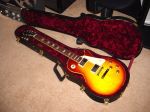
Photo by Thomas Faivre-Duboz
How did a young boy who couldn’t even read music become one of the single most influential people in music history? He followed his passion, took chances and never gave up. Today we remember Les Paul, inventor and guitar legend, who passed away last Thursday, August 13th, at the age of 94.
These days, anyone who knows anything about electric guitars knows the name Les Paul. Finding the guitar that is right for you is a challenge for anyone, and Simon recommends these acoustic guitars for anyone looking to take up music as a passion. However, Les Paul was not fully satisfied by the acoustic guitar, and endeavoured to find a way to electrify the guitar.
Known as “the Thomas Edison of the music industry,” Lester William Polfuss grew up in Waukesha, Wisconsin and nurtured his love of music from an early age, teaching himself how to play harmonica by emulating the sounds of popular country artists. Soon he moved on to the banjo and then the guitar. He practiced constantly and by age 13, he was playing country music semi-professionally. Faced with the desire to play the harmonica and guitar simultaneously, he invented a harmonica holder that could be worn around his neck in order to hold the instrument in place without using his hands. This popular holder is still manufactured and widely used today.
Paul continued playing guitar and harmonica and singing throughout his adolescence. Eventually he was invited to join the Wolverton’s Radio Band in Missouri and he dropped out of high school to pursue the opportunity. He worked persistently to develop his talent and gain exposure for his music. As a result, his first two albums were released when he was 21 years old.
In his mid-twenties, Paul grew restless with acoustic guitars and began experimenting with his own designs, determined to electrify the guitar without distorting the sound. His labors produced “The Log”, one of the first solid-body electric guitars, which was comprised of nothing more than a 4×4 piece of wood, a bridge, a guitar neck and pickup affixed to a hollow-body guitar that he had sawed in half. His experiment proved successful, he had created the electric guitar. You’d think that a guitar manufacturer would jump at the chance to produce such an innovative instrument, but when Paul approached Gibson with his invention they rejected him, calling it “a broomstick with pickups.” It wasn’t until Fender produced a solid-body electric guitar, nearly a decade later, that Gibson was ready to consider Paul’s design. The result was the Gibson Les Paul, an instrument that shaped rock and roll as we know it and went on to gain popularity among rock icons like Eric Clapton, Eddie Van Halen and Jimmy Page.
In his thirties, Paul started experimenting with recording techniques. He created a recording called “Lover (When You’re Near Me)”, in which he played eight different guitar solos by himself, laying down the tracks on top of each other. From this experiment, multitracking was born. It wasn’t a simple process and he worked on the sound until it was precisely the way he wanted it. By the time it was all said and done, he had thrown out over 500 recording disks. But the end product was phenomenal and sounded unlike anything of its time. It makes you wonder what he could have achieved if he had access to audio equipment such as this. Paul’s perfectionism paid off when Capitol Records released the recording when he was 33.
That same year, Paul’s music career nearly came to an end when his car swerved off a bridge during a snowstorm and plunged into the river below. He nearly died, shattering bones throughout his body including his right arm and elbow. Desperate to continue playing, he instructed surgeons to set his arm at a right angle so he could still cradle and pick his guitar. Recovery took nearly two years but Paul’s passion never faltered.
Over his long career, Les Paul invented a number of recording techniques and devices, like the first eight-track recording deck, and won numerous awards for his work. He tried retiring in his fifties but to no avail. His passion for music wouldn’t let him rest and he returned to the stage and continued releasing albums and winning Grammys well into his 90s. He passed away last Thursday from complications of pneumonia, leaving his unmistakable mark on the world.
“Without the things you’ve done, I wouldn’t be able to do half the things I do.” – Eddie Van Halen to Les Paul

The Gibson Les Paul, one of the world's most popular electric guitars, was named in honor of Paul.



[…] in the stars and their passions are revealed to them at a very early age – think Mozart and yesterday’s post on guitar legend, Les Paul. For others, the revelation comes later in life as an epiphany or the […]